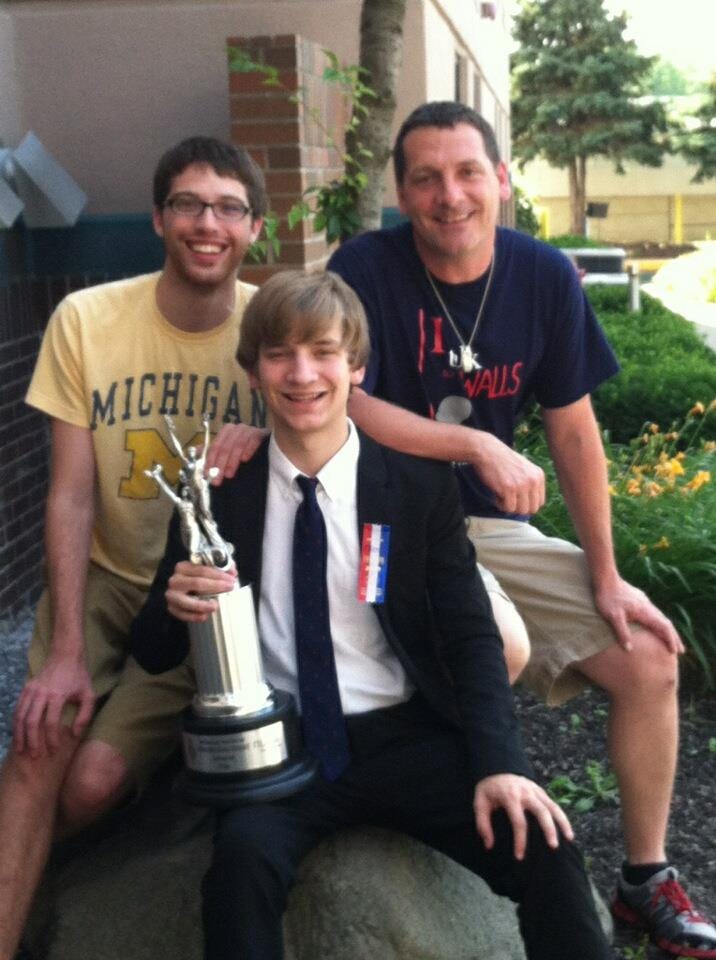Where Do We Go From Here?
Donate here: http://www.indiegogo.com/projects/the-debate-league?c=home

Where Do We Go From Here?
Ty Joplin
Give a quick glance at the debate community, and you’ll see frenetic brains hissing at each other at high-speeds, kids dressing like mid-career freelance journalists, feverish yet for the most part respectful rivalries, and passion. A whole lot of spitting, heated passion. Amongst our toils, differing opinions, and snarky comments, there’s the underlying center that we all gravitate towards: a love for the activity. A love for thinking, arguing, impressing, depressing (if you’re into narratives), and compressing complex realms of thought into well-crafted cases with contentions that compel or repulse whoever is listening. We love it. Many of us who graduate go on to coach and judge at tournaments, keeping alive the connections and bonds we cultivated during our initial 4-year tenure.
But amidst all the stress and glory that is debate, we often forget that a lot of kids would love to join in on all the fun we’re having. For every one well-dressed student turning the hell out of that bastardized Foucault card, there’s ten ambitious kids sitting at home, twiddling their thumbs, wishing for some kind of break but, for all intents and purposes, unable to get one either because their school’s budget can’t afford a debate team, or they have to work a remedial job to help pay bills, or because they’ve given up on the real-world being kind and altruistic to them. Many of us have heard of or have experienced Debate’s miraculous ability to provide a safe space for personal and professional growth, and we all know that there are many thousands of students desperately looking for that safe space.
Most of us know that a lot of people could really, really use the privilege of having debate in their lives. But we treat this knowledge like an awkward guest at our party—we look over, see them, shake our heads and say, “that’s unfortunate” under our breaths, then go back to the dance-floor with our expandos. We argue for things like utilitarian frameworks preceding literally every ethical consideration, but overlook the fact serving the wellbeing of as many people as possible could mean giving people an opportunity to participate in an activity that affects each and every one of us in deep, profound and unique ways.
The most unfortunate aspect of our party is that it can go on while many people are left uninvited. We’re used to being a pretty tight-knit, small community. Debate can survive, even thrive under its current conditions—there’s no imminent internal crisis to respond immediately to. There’s just an ever-brooding sense that debate could mean so much more, and have an exponentially larger impact if we prioritized broader access just a little bit higher than where it is currently.
I’m trying to do my part in expanding the party. Currently, I’m seeking to get a campaign off the ground to get Speech and Debate in schools in Philadelphia, and it’s proving to be a bit of work. But this isn’t the kind of job to be relegated to a few community members who are given pats on the back for their efforts and a cold shoulder if they ever ask for somebody to help them. This is the kind of job that should be more integral to the community’s center. Would that mean a small transformation in the nature of the activity? No. Would that mean a small change in how we conduct our business as members of this special community? Yes. An email to a principal here. Some quick tips for fundraising to a newly started team there. A talk at a district board meeting over there. Nothing to significantly change the trajectories of our lives, but definitely something that could change the trajectories of others who might need debate just as much as we do.
We could make debate better by reaching out to schools without teams across the nation, talking to faculty, talking to students, persuading administrations (something we should be very good at), teaching young, ambitious minds how to fundraise, research, speak with confidence, articulate tough ideas concisely, and dream bigger than how they otherwise would be permitted to do. We could do all of this relatively easily. Or we could just as easily keep dancing while trying to avoid looking over our shoulder to see how many deserving and eager people are turned down at the door.
Ed. note: Ty Joplin is a 2012 graduate of Cypress Woods High School in Cypress, TX. His senior year, Ty qualified to the TOC earning bids at St. Marks and Winston Churchill. He also advanced to quarterfinals of TFA State as well as deep outrounds of NFL Nationals. He currently attends Haverford College in PA.




